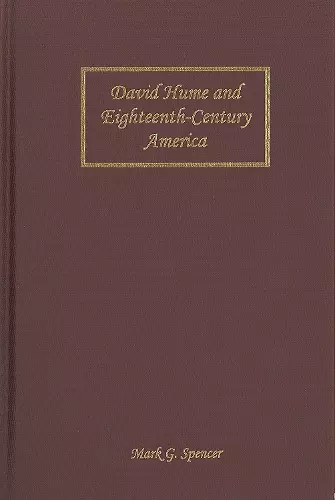David Hume and Eighteenth-Century America
Format:Hardback
Publisher:Boydell & Brewer Ltd
Published:15th Jun '05
Currently unavailable, and unfortunately no date known when it will be back
This hardback is available in another edition too:
- Paperback£45.00(9781580463447)

A thorough examination of the role which David Hume's writings played upon the founders of the United States. This book explores the reception of David Hume's political thought in eighteenth-century America. It presents a challenge to standard interpretations that assume Hume's thought had little influence in early America. Eighteenth-century Americans are often supposed to have ignored Hume's philosophical writings and to have rejected entirely Hume's "Tory" History of England. James Madison, if he used Hume's ideas in Federalist No. 10, it is commonly argued, thought best to do so silently -- open allegiance to Hume was a liability. Despite renewed debate about the impact of Hume's political ideas in America, existing scholarship is often narrow and highly speculative. Were Hume's works available in eighteenth-century America? If so, which works? Where? When? Who read Hume? To what avail? To answer questions of that sort, this books draws upon a wide assortment of evidence. Early American book catalogues, periodical publications, and the writings of lesser-light thinkers are used to describe Hume's impact on the social history of ideas, an essential context for understanding Hume's influence on many of the classic texts of early American political thought. Hume's Essays and Treatises on Several Subjects, was readily available, earlier, and more widely, than scholars have supposed. The History of England was read most frequentlyof all, however, and often in distinctive ways. Hume's History, which presented the British constitution as a patch-work product of chance historical developments, informed the origins of the American Revolution and Hume'ssubsequent reception through the late eighteenth century. The 326 subscribers to the first American edition of Hume's History (published in Philadelphia in 1795-96) are more representative of the History's friendlyreception in enlightened America than are its few critics. Thomas Jefferson's latter-day rejection of Hume's political thought foreshadowed Hume's falling reputation in nineteenth-century America. MARK G. SPENCER is Associate Professor of History at Brock University where he holds a Chancellor's Chair for Research Excellence. His books include Hume's Reception in Early America (2002), Utilitarians and Their Critics in America, 1789-1914 (2005),and Ulster Presbyterians in the Atlantic World (2006).
This is an exceptionally good book: it unequivocally establishes the prevalence of 'flawed assessments of Hume's reception in America, [and] serious misunderstandings about the intellectual origins of the American Revolution.' The book is very well-written, impeccably documented, and should be in every self-respecting library -- private or institutional. -- -- Peter Jones, Enlightenment and Dissent
One central truism about historical scholarship is challenged head-on by Mark Spencer's new book. This is that all answers are necessarily provisional, subject to endless adjustment and further revision in the light of subsequent evidence and refinements in argument. That is likely to brook no such contingency will be obvious to all who read it. For with exemplary commitment to the recovery and analysis of previously unknown data, it will scorch forever a series of assumptions, important to an understanding of the relationship of the Scottish Enlightenment and the American Revolution, that have hitherto enjoyed remarkable currency. -- -- David Allan, Scottish Historical Review
Copiously researched, David Hume and Eighteenth-Century America recovers Hume's importance, particularly as a political theorist, to a wide range of readers and writers in the late colonial, revolutionary, and early republican periods. Spencer gives the impression of leaving no stone unturned: book, catalogues, newspaper articles, political tracts, correspondence, and subscription lists are all mined for Hume's appearances and echoes. Spencer's book is a model of rigorous investigative scholarship, and is likely to remain the standard work for years to come on the topic of David Hume and eighteenth-century American political thought. -- -- Adam Potkay, College of William & Mary * EIGHTEENTH-CENTURY LIFE *
ISBN: 9781580461184
Dimensions: unknown
Weight: 1016g
546 pages